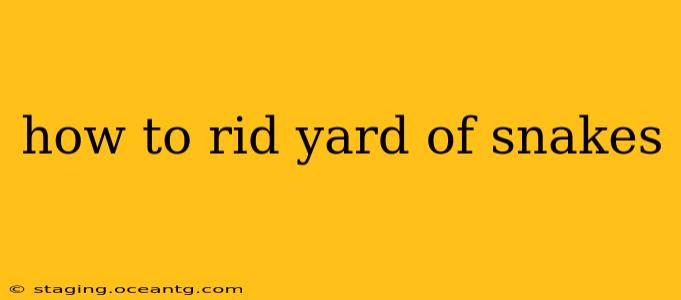Snakes in the yard can be unsettling, but understanding their presence and employing effective, humane methods for removal is crucial. This guide will walk you through various strategies, answering common questions and offering expert advice on how to make your yard less appealing to snakes while protecting both them and your family.
Why Are Snakes in My Yard?
Snakes are drawn to areas providing food, water, and shelter. Understanding what attracts them to your property is the first step in deterring them. Common attractants include:
- Rodents: Mice, rats, and voles are a primary food source for many snake species. A rodent infestation practically guarantees snake activity.
- Amphibians: Frogs, toads, and salamanders also attract snakes, particularly those that prefer damp environments.
- Shelter: Dense vegetation, rock piles, woodpiles, compost heaps, and even sheds offer ideal hiding places and protection from predators.
- Water sources: Birds baths, leaky faucets, and poorly drained areas provide water for snakes to drink and thrive.
How Do I Get Rid of Snakes Humanely?
The most effective approach is to make your yard less hospitable to snakes rather than directly trying to kill them. Killing snakes is often illegal and disrupts the local ecosystem. Here are humane methods:
- Eliminate Food Sources: This is the most crucial step. Regularly inspect your home and yard for signs of rodents and control infestations with traps or professional pest control. Keep pet food inside and clean up spilled food promptly.
- Remove Shelter: Clear away dense vegetation, remove or organize woodpiles, and ensure your compost is well-maintained and doesn't become overly damp. Seal cracks and crevices in your home and shed foundations where snakes might hide.
- Reduce Moisture: Repair leaky pipes and faucets, improve drainage to prevent puddles, and consider removing stagnant water sources like birdbaths periodically.
- Secure your property: Use barriers like chicken wire or hardware cloth to prevent snakes from entering your home or garage.
What Repellents Work on Snakes?
While many commercial snake repellents are available, their effectiveness is often debated. Some natural repellents show some promise, but none offer a guaranteed solution. These include:
- Ammonia: The strong smell of ammonia can deter snakes, but the effect is temporary and requires repeated application. It's not environmentally friendly and can be harmful to pets.
- Sulfur: Similar to ammonia, sulfur-based products can create an unpleasant odor that repels snakes.
- Commercial Repellents: These often contain ingredients similar to ammonia or sulfur, sometimes with added scents designed to deter snakes. Their effectiveness varies widely.
Important Note: Always read the label carefully and follow the manufacturer's instructions for any repellent you use.
What to Do if You See a Snake in Your Yard?
- Remain calm: Most snakes are non-venomous and will try to avoid confrontation.
- Keep a safe distance: Do not approach or attempt to handle the snake.
- Identify the snake (if possible): Knowing the species can help determine if it is venomous. Use a reputable online resource or field guide for identification, but do not get too close!
- Contact a professional: If you are uncomfortable or concerned about the snake, contact a local wildlife removal service or animal control.
Are there snakes that are harmful in my area?
The presence of venomous snakes varies significantly by geographic location. Knowing the venomous snakes in your area is essential for safety. Research your local venomous species and their characteristics to be able to identify them from a distance. Always treat any unknown snake with caution.
How to Prevent Snakes from Entering My House?
Prevention is key. The same strategies used to deter snakes from your yard also apply to your house. Seal all cracks and openings, remove potential food sources from around your foundation, and keep vegetation trimmed away from the exterior walls. Regular inspections can help catch potential entry points before they become a problem.
By implementing these strategies, you can significantly reduce the likelihood of snakes in your yard, creating a safer and more peaceful environment for both you and the wildlife around you. Remember that a humane and preventative approach is always the most effective and responsible way to manage snake populations.
